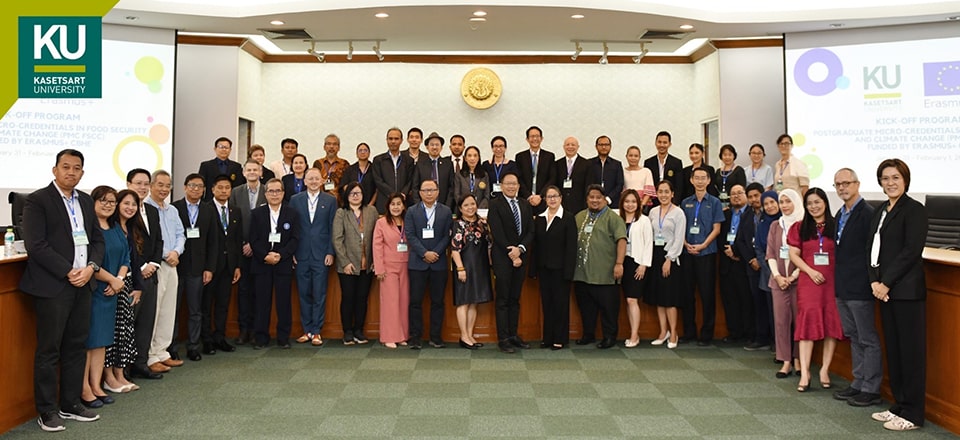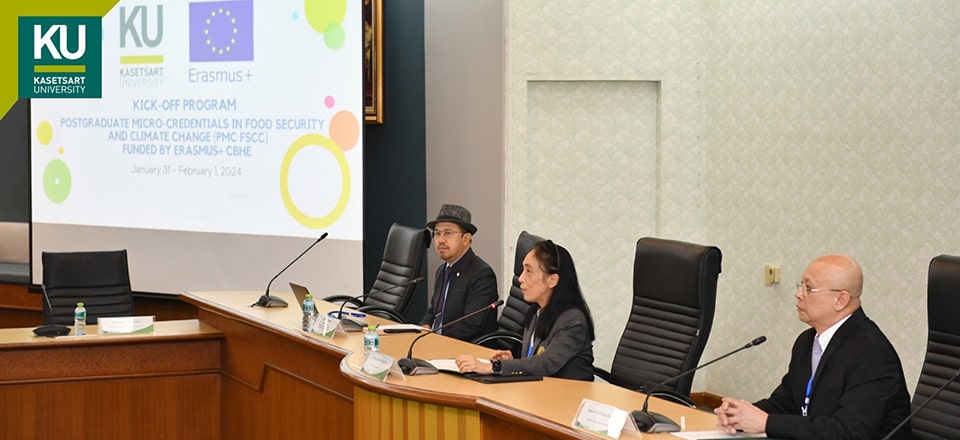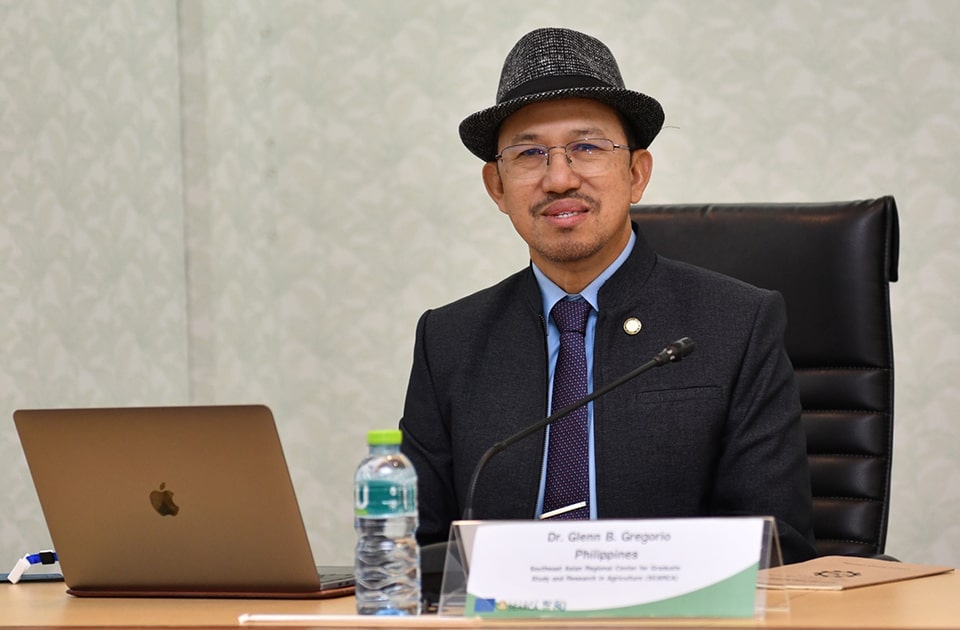
SEARCA attended the kick-off meeting led by Kasetsart University (KU) for the Postgraduate Micro-Credentials on Food Security and Climate Change (PMC FSCC) project, held from 31 January to 1 February 2024. The initiative, funded by the European Commission ERASMUS+ Capacity Building in Higher Education (CBHE), spans from 2023 to 2026, aiming to deliver learner-centered short-term courses through micro-credentials to address food security and climate change concerns. The project also intends to utilize advances in digital technologies to develop and offer online modules that will address the twin issues of food security and climate change.
 (L-R) Dr. Glenn B. Gregorio, SEARCA center director; Assoc. Prof. Dr. Ladawan Puangchit, vice president for academic affairs, KU; and Assoc. Prof. Dr. Buncha Chinnasri, assistant to the president for quality development, deputy director of KU International College, and executive officer of the UC, KU
(L-R) Dr. Glenn B. Gregorio, SEARCA center director; Assoc. Prof. Dr. Ladawan Puangchit, vice president for academic affairs, KU; and Assoc. Prof. Dr. Buncha Chinnasri, assistant to the president for quality development, deputy director of KU International College, and executive officer of the UC, KU
Dr. Glenn B. Gregorio, SEARCA center director, congratulated all the partner universities for successfully crafting the project proposal and having it approved for funding from the European Commission. The kick-off meeting provided directions for participating universities in implementing the project strategically and efficiently in the coming years. Dr. Gregorio reinforced SEARCA's unwavering support to ensure that all outputs will be of quality and delivered on time. The project is also a concrete example of the evolving landscape of education as the world enters an era of internationalization, giving educators and learners inclusivity and flexibility.

The kick-off meeting brought leading universities in Southeast Asia and Europe together such as Institut Pertanian Bogor (IPB), Universitas Gadjah Mada (UGM), and Universitas Brawijaya (UB) from Indonesia; Universiti Putra Malaysia (UPM) and Universiti Malaysia Sabah (UMS) from Malaysia; Maejo University (MJU) and Kasetsart University (KU) from Thailand; UP Los Baños (UPLB), Central Luzon State University (CLSU), and Visayas State University (VSU) from the Philippines; Universitaet Fuer Bodenkultur Wien (BOKU) from Austria; and Georg-August-Universitat Gottingen Stiftung Offentlichen Rechts (UGOE) from Germany, who attended the meeting online. KU leads the project, with SEARCA providing support as secretariat for the Southeast Asian University Consortium for Graduate Education in Agriculture and Natural Resources (UC).
Resource speakers from different sectors, including academia, government, industry, and nongovernmental organizations, attended the kick-off meeting to discuss the need to offer postgraduate micro-credentials in food security and climate change. Ms. Rosalind Amornpitakpun, director of Climate Change Adaptation Guideline and Capacity Development from the Department of Climate Change and Environment, discussed the climate change and food security issues and the importance of climate change and food security programs in Southeast Asia. Dr. Kanjana Kwanmuang, deputy secretary general of the Office of Agricultural Economics, expressed her excitement and hope for the project. She recommended that the content include a basic understanding of food security and climate change, with data made accessible through a public platform.
Ms. Rejani Kunjappan, Dr. Hao Zhung, Dr. Horst Weyerhaeuser, and Dr. Pin Pravalprukskul from the Regional Community Forestry Training Center for Asia and the Pacific (RECOFTC), Explore, and Wyss Academy presented their organization's thrust, strategic plan for 2023–28, their training programs, and the Wyss Academy for Nature. Mr. William Sparks, country director for Thailand from Winrock International, introduced the USDA Thailand Regional Agriculture Innovation Network (RAIN) and shared their programs to empower key actors to scale solutions.
In addition to discussing the need for the course, the kick-off meeting included presentations on existing micro-credentials offered by project member universities. KU's School of Integrated Science and the Graduate School presented their course offerings. SEARCA shared the results of a survey on micro-credential programs in project member universities, while UGOE provided insights into the European Union's experience with micro-credentials. The two-day meeting concluded with partner institutions discussing the work packages, deliverables, deadlines, budget considerations, and administrative requirements, collectively formulating a working definition of micro-credentials within the project's context.